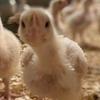Sustainability and animal welfare
Published: February 22, 2021
Source : Dr. Shawna Weimer, University of Maryland. Reviewers: Dr. Marisa Erasmus, Purdue University; Dr. Leonie Jacobs, Virginia Tech; Dr. Prafulla Regmi, North Carolina State University.

Animal Welfare is Key to the Sustainability of the Poultry Industry
Animal welfare is in the eye of the beholder. Some consumers are willing to pay more for products from companies with reputations that align with their beliefs. The concept of animal welfare is shaped, in-part, by the ethics of what constitutes a quality life. With a heavy animal activist influence, the consumer is the primary stakeholder driving the dynamics of change in how poultry are raised in the United States.

What is Sustainability?
Sustainability is defined as “the ability to be maintained at a certain rate or level” but today the most common use for the term is referring to how we can make changes that do not negatively affect the environment.
In other words, we should meet today’s needs without compromising the ability of future generations to meet their needs. Successful corporations must be committed to being good stewards of the environment and of the social landscapes in which they operate.
Animal welfare is an important stewardship anchor in the social landscape of the poultry industry.

Environmental Stewardship is not Animal Welfare Stewardship
Environmental stewardship, animal welfare, and corporate sustainability commitments may not always align.
Ultimately, food affordability and consumer preferences shape the evolution of the poultry industry’s commitments both to sustainability and to animal welfare.
However, raising animals to higher welfare standards and producing products with a lower carbon footprint may tip the corporate sustainability scale.
What is Animal Welfare?
The term animal welfare is defined as "the welfare of an individual is its state in regards to its attempts to cope with its environment" (Broom, 1986).
Animal welfare assessments are criteria for measuring sustainability because the public will not accept animal products from systems that cause poor welfare.

Animal Welfare Sustainability in Context
Animal welfare is often under the same umbrella as sustainability because improvements in both are viewed as progress towards the future.
In other words, any improvement in animal welfare potentially has less impact on the surrounding environment. However, the relationships between poultry production, welfare, and the impact of production on the environment are complex and difficult to balance.
Animal welfare is essential to the sustainability of the poultry industry because healthy animals provide consumers with a healthy product.
Independent of consumer demands, it is the corporate responsibility of the poultry industry to assure their birds are raised with high welfare standards.
The incorporation of science-based indicators of animal welfare into animal welfare assurance programs is the key to the sustainability of the poultry industry.
This article was originally published on Poultry Extension Collaborative (PEC) and it is reproduced here with permission from the authors.
Related topics:
Authors:




Show more
Recommend
Comment
Share

Would you like to discuss another topic? Create a new post to engage with experts in the community.




















